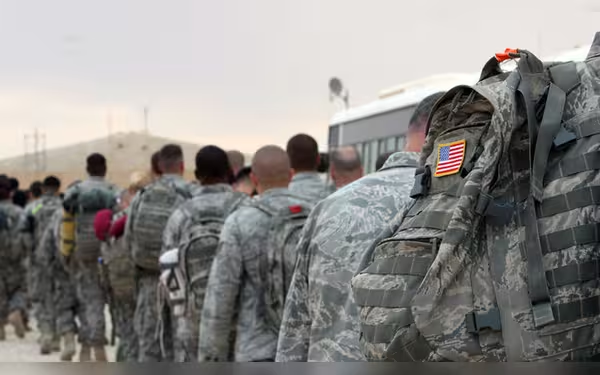Thursday, November 7, 2024 12:42 PM
US Military Presence in Iraq: A Complex Withdrawal Scenario
- US troops engage in joint operations with Iraqi forces.
- Daesh resurgence complicates potential US withdrawal.
- Iraq's military still relies heavily on US support.
 Image Credits: thefrontierpost
Image Credits: thefrontierpostThe US military presence in Iraq remains complex amid Daesh resurgence and geopolitical challenges, complicating any potential withdrawal.
The situation regarding the United States military presence in Iraq is a complex issue that has significant implications for security in the Middle East. Currently, around 2,500 American troops are stationed in Iraq as part of an international effort to prevent the resurgence of Daesh, a terrorist group that has caused widespread destruction and instability in the region. These troops are not just there for show; they engage in joint operations with local forces, including the Iraqi Security Forces, to combat terrorism effectively.
Despite the importance of this military presence, it rarely makes headlines in the United States. During the ongoing presidential campaign, there has been little meaningful discussion about the future of American troops in Iraq. However, behind the scenes, both the US and Iraqi governments are actively discussing this matter. A complete withdrawal of US forces, similar to what happened in Afghanistan in August 2021, seems unlikely. Instead, the US is expected to shift from combat operations to a more traditional security partnership with Iraq.
As of now, there is no set timeline for when US troops might leave Iraq, and negotiations between Washington and Baghdad are progressing slowly. Several factors contribute to this cautious approach. First and foremost is the reemerging threat of Daesh. After suffering a significant defeat in 2019, the group has been making a comeback. In the first half of 2024 alone, Daesh conducted 153 attacks in Iraq and Syria, which is double the number from the same period in 2023. This alarming increase in violence highlights the ongoing threat that Daesh poses and cannot be overlooked.
Another critical factor is the regional geopolitics, particularly concerning Iran. While the US military presence in Iraq primarily focuses on counterterrorism, it would be naive to ignore Iran's increasingly aggressive role in the region. In recent months, Iran and its proxies have intensified their attacks, which undoubtedly influences US policymakers. Although the Iraqi government may not publicly acknowledge it, the situation with Iran is a significant consideration in their discussions.
Moreover, the capabilities of the Iraqi army must be assessed. Following its disastrous collapse in 2014 during Daesh's assault on Mosul, the Iraqi army has made considerable progress, aided by international forces. However, it still heavily relies on US support for counterterrorism operations. For instance, last year, the Iraqi army conducted only five independent operations against Daesh without coalition assistance. Given the rising activity of Daesh, the Iraqi army has a long way to go before it can independently handle the counterterrorism mission.
Additionally, coordination with NATO is essential. Many may not realize that NATO is actively involved in training missions in Iraq, and relations between Iraq and NATO have strengthened in recent years. US Central Command's General Michael Kurilla has stated that any decision regarding the withdrawal of US forces will be made in close coordination with NATO. Recently, Iraq’s national security adviser visited NATO to discuss enhancing relations and the ongoing training mission.
Considering all these factors, it is evident that a US withdrawal from Iraq is not on the immediate horizon. While there was some speculation about a potential withdrawal by the end of this year, the geopolitical landscape and logistical challenges make this scenario unlikely. Furthermore, with the upcoming US presidential election in November, Iraq’s government will be closely monitoring the situation. Regardless of the election outcome, President Joe Biden will be in a lame-duck position, making it improbable for Baghdad to finalize discussions with the White House on such a crucial issue.
Both Americans and Iraqis may prefer to see a reduction in US troops, but it is vital that any withdrawal is conducted responsibly and realistically. The last thing either Iraq or the broader region needs is a repeat of the hasty withdrawal that occurred in 2011 under President Barack Obama. That decision led to a resurgence of Daesh and significant instability in Iraq. Therefore, it is in the best interest of both nations to evolve their military relationship into a more traditional security partnership, with the timeline dictated by the realities on the ground rather than wishful thinking.













